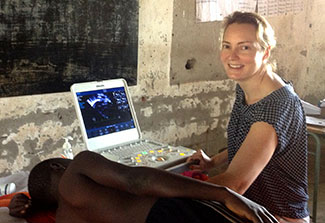
Profile: Armed with career development award, former Fogarty Fellow Dr Amy Sims Sanyahumbi fights rheumatic heart disease in Malawi
March / April 2018 | Volume 17, Number 2

Photo courtesy of Dr. Amy Sims Sanyahumbi
Five years after completing a Fogarty global health fellowship in pediatric cardiology, Dr. Amy Sims Sanyahumbi has returned to Malawi with a prestigious Fogarty grant, the International Research Scientist Development Award (IRSDA), and a new focus: she wants to work toward eradicating rheumatic heart disease. Also known as a K award, the IRSDA gives early career researchers protected time to focus on research and engage in professional development activities, both of which, said Sims Sanyahumbi, are critical for anyone embarking on a global health career.
Her 2011-13 Fogarty fellowship led to her new award, said Sims Sanyahumbi. "The Fogarty fellowship helped me to build a foundation in research, and helped to solidify my research interests. It also smoothed the path to the award because without the experience of the fellowship, it would have been much more difficult coming to a different country and environment than I'm used to, and just hop in and perform research," she explained.
As a fellow, Sims Sanyahumbi studied deficiencies in cardiac function in children with HIV. She also ran the pediatric cardiology clinic in Lilongwe, Malawi. As she examined sick children, she noticed that "every other child I saw had rheumatic heart disease," she said. "Seeing so many children with such a devastating, completely preventable disease was heartbreaking, so I decided to help do something about it."
Rheumatic heart disease occurs when a seemingly banal strep throat infection is not adequately treated with antibiotics. This can lead to a child developing acute rheumatic fever and, in some cases, rheumatic heart disease, which results in permanent damage to the heart valves. This disease forces the heart to work harder to pump blood and, over time, may cause heart failure. While rheumatic fever usually occurs in children aged 5-15, it can be years before any heart-related symptoms are evident. The saddest aspect is that advanced disease can be prevented by low-cost monthly injections of penicillin, Sims Sanyahumbi said. Among the questions she will seek to answer are whether poor adherence is to blame for the high number of children with rheumatic heart disease in Malawi.
She plans to register children with rheumatic heart disease in the capital city, Lilongwe, and then track their follow-up care for a year. After gathering and analyzing those data, Sims Sanyahumbi said she will look for barriers to and facilitators of care, and will work to develop a comprehensive strategy that harnesses mobile and eHealth tools to improve adherence in low- and middle-income countries (LMICs) like Malawi.
Another key goal is to train Malawians in pediatric cardiology, echocardiography, patient care, and how to conduct research. "There is one pediatric cardiologist in Malawi and there are an estimated 169,000 cases of rheumatic heart disease in the country," she says. "Something that can be shared with my Malawian colleagues are the skills needed to better diagnose and care for these patients."
Sims Sanyahumbi's primary mentors are Dr. Peter Kazembe, the executive director of the Baylor HIV clinic in Malawi, and Baylor College of Medicine associate vice chair for research in pediatrics, Dr. Kristy Murray, in Houston, Texas. "While in Africa, I will have Skype meetings with my Houston team but having a strong mentorship team on the ground in Africa is also very important," said Sims Sanyahumbi. The outcomes of her research are expected to benefit not only children in LMICs but also in the United States, where, although the incidence of rheumatic heart disease has declined to the point that it is no longer a notifiable disease, "We still see it, particularly in areas of high poverty or in places with a significant immigrant population," noted Sims Sanyahumbi.
More Information
- About the International Research Scientist Development Award (IRSDA)
- Related IRSDA award: Improving Adherence to Penicillin Among Children with Rheumatic Heart Disease in Malawi, Africa
- Related grant awards announcement: Early-career scientists receive $3.3M to help establish independent research careers
Nov / Dec 2017 Global Health Matters - Previous profile: Fogarty Fellow Dr Amy E Sims researches pediatric cardiology in Malawi
Jan / Feb 2013 Global Health Matters
To view Adobe PDF files, download current, free accessible plug-ins from Adobe's website .





















.png)









No hay comentarios:
Publicar un comentario